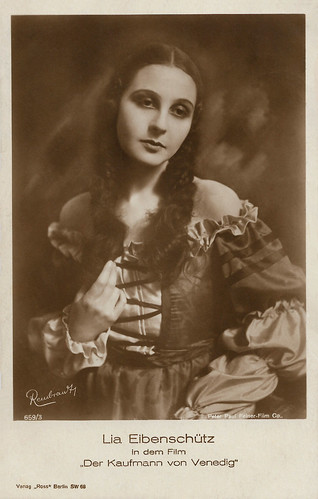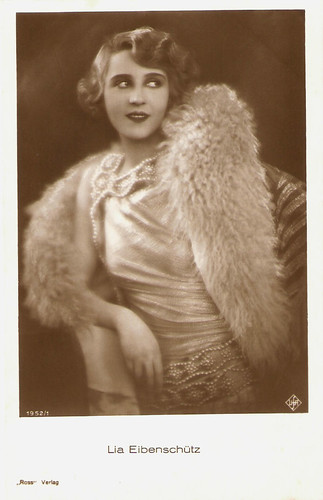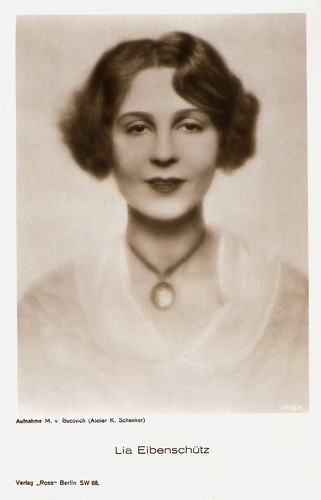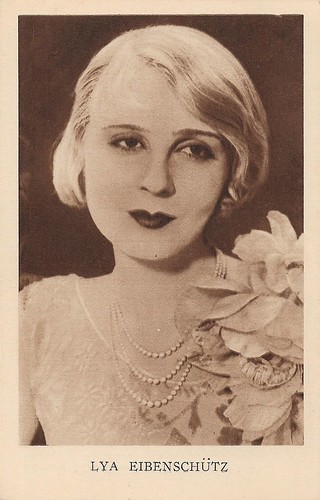
German postcard by Ross Verlag, Berlin, no. 659/3. Photo: Rembrandt / Peter Paul Felner-Film Co. Lia Eibenschütz as Jessica in Der Kaufmann von Venedig/The Merchant of Venice (Peter Paul Felner, 1923).

French postcard by Cinémagazine-Edition, no. 527. Lia Eibenschütz in Paname...n'est pas Paris/Die Apachen von Paris (Nikolai Malikoff, 1927).

German postcard by Ross Verlag, no. 1952/1, 1927-1928. Photo: Ufa.
Discovered during a concert tour
Lia (or Lya) Eibenschütz was born Lina Mathilde Eibenschütz in 1899 in Wiesbaden, Hesse, Germany. She had Austro-Hungarian ancestors. Her father, Albert Maria Eibenschütz was a pianist and conductor, and her mother, Wilhelmine Marianne Eibenschütz-Wnuczek was also a successful pianist.
So it was not surprising that daughter Lia also studied music and worked as a singer and pianist. She was discovered as an actress in Berlin in 1919 during a concert tour. She debuted on-screen in the leading role of Der Tempel der Liebe/The Temple of Love (Paul Ludwig Stein, 1919). In the 1920s, she could be seen in numerous silent films, often as the enamoured young woman or elegant socialite. She played Baroness Edda von Gerding in Die große und die kleine Welt (Max Mack, 1921), and Countess Polignac in the biopic Marie Antoinette - Das Leben einer Königin (Rudolf Meinert, 1922) with Diana Karenne in the title role.
Other memorable parts she had in Nathan der Weise/Nathan the Wise (Manfred Noa, 1922) starring Werner Krauss and based on the play by Gotthold Ephraim Lessing, the tragicomedy Der Puppenmacher von Kiang-Ning/The Doll Maker of Kiang-Ning (Robert Wiene, 1923) again with Krauss, and the William Shakespeare adaptation Der Kaufmann von Venedig/The Merchant of Venice (Peter Paul Felner, 1923) starring Henny Porten as the rich Portia, Werner Krauss as Shylock, and Harry Liedtke as Bassanio. Eibenschütz played Shylock's daughter Jessica.
She also starred in Die Dame aus Berlin/The Lady of Berlin (Lorand von Kabdebo, 1925) again with Krauss, and Die Apachen von Paris/Paname... n'est pas Paris/Apaches of Paris (Nikolai Malikoff, 1927) with Jaque Catelain and Ruth Weyher. The latter was a Franco-German co-production, distributed by Ufa. According to Cinémagazine, a fire broke out on Thursday 31 July 1927 in the editing room of the G. M. Film factory in Billancourt, where the film was being developed. As the film had just been finished, the producers decided to re-shoot the film completely.
Lia Eibenschütz was also the leading lady in the early sound film Der Korvettenkapitän/The Corvette Captain (Rudolf Walther-Fein, 1930), a romantic comedy in the Navy with Harry Liedtke, Maria Paudler and Fritz Kampers. But from the early 1930s onward her parts became smaller.

German postcard by Ross Verlag, no. 658/1. Photo: Peter Paul Felner-Film Co. Henny Porten and Lia Eibenschütz in Der Kaufmann von Venedig/The Merchant of Venice (Peter Paul Felner, 1923).

German postcard by Ross Verlag, Berlin, no. 658/2. Photo: Rembrandt / Peter Paul Felner-Film Co. Henny Porten as Porzia and Lia Eibenschütz as Jessica in Der Kaufmann von Venedig/The Merchant of Venice (Peter Paul Felner, 1923).

German postcard by Ross Verlag, no. 658/4. Photo: Peter Paul Felner-Film Co. Publicity still for Der Kaufmann von Venedig/The Merchant of Venice (Peter Paul Felner, 1923). Henny Porten as Porzia/Portia and Lia Eibenschütz as Jessica. The man far right is Carl Ebert (Antonio).
Women of the world
Lia Eibenschütz also worked on the Berlin stage, often performing women of the world. After she married actor Kurt Vespermann in 1927, she retired more and more into private life in the 1930s. She was last seen on stage at the famous Berlin Kabarett der Komiker in the 1932/1933 season. She quitted the sets in 1932 and only appeared in three sound film productions, among others in Friedrich Zelnik's comedy Ein süßes Geheimnis/A sweet secret (1932) as the film daughter of the Viennese folk actress Hansi Niese.
She dedicated herself to the education of her son, the later actor Gerd Vespermann (1926-2000). Since the Nazis considered her as a "half-Jew", or non-Aryan, Eibenschütz faced increasing problems and was finally excluded from the Reichstheaterkammer in 1937. In hindsight, it is therefore quite remarkable that in the 1920s she did so many films with Werner Krauss, who would become a Nazi and virulent anti-semite in the 1930s. Then again, in the 1920s Krauss was considered one of Germany's best stage and screen actors.
After the end of the Second World War, Lia Eibenschütz took on a few small roles in German film productions. These include Madame de la Rocco in the comedy Das Haus in Montevideo/The House in Montevideo (Curt Goetz, Valerie von Martens, 1951) and the character of Frau Mertens in the Hans Albers thriller Der Greifer/The Ripper (Eugen York, 1958). She appeared as Lady Curtain in the Edgar Wallace adaptation Neues vom Hexer/Again the Ringer (Alfred Vohrer, 1965) with Heinz Drache as Inspector Wesby, and mimed the mother of the over-excited fashion designer Emile Cavin (Hanns Lothar) in the crime comedy Lange Beine - lange Finger/Long Legs, Long Fingers (Alfred Vohrer, 1966) with Martin Held, Senta Berger and Joachim Fuchsberger.
She also returned to Berlin as a theatre actress, for example at the Renaissance Theater. Occasionally, she also worked as a voice actress, for example for the film The Life and Death of Colonel Blimp (Michael Powell, Emeric Pressburger, 1943). Her last film role was as the mother of the girl Johanna (Verena Buss) in the auteur film Der sanfte Lauf/The Soft Course (Haro Senft, 1967) with Bruno Ganz in his first leading role in the cinema. She also appeared on TV on several occasions, such as the mother-in-law of the title character (Heidelinde Weis) in the TV series Meine Frau Susanne/My wife Susanne (Erik Ode, 1963).
Lia Eibenschütz acted in almost 70 films and TV series and passed away in 1985 in West Berlin, shortly before her 86th birthday. She is buried in the Kaiser Wilhelm Memorial Cemetery in Berlin, next to her husband Kurt Vespermann. Lia Eibenschütz is not to be confused with the German stage actress Camilla Eibenschütz.

German postcard by Ross Verlag, no. 1715/1, 1927-1928. Photo: Mario von Bucovich (Ateler Karl Schenker).

German postcard by Ross Verlag, no. 3421/1, 1928-1929. Photo: Ufa.

Belgian postcard by S. A. Cacao et Chocolat Kivou, Vilvorde/ N. V. Cacao en Chocolade Kivou, Vilvoorde.
Sources: Stephanie d'Heil (Steffi-Line - German), Thomas Staedeli (Cyranos), Filmportal.de, Wikipedia (German), and IMDb.
No comments:
Post a Comment